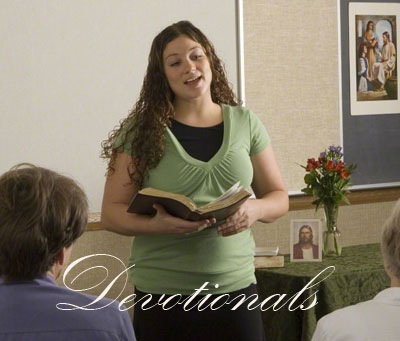Youth devotionals — they can put the most patient of teachers over the edge. The forgetting, the faking, the false doctrine, the too-familiar gospel cliches all combine in a slow-moving train wreck that can make opening exercises in your class a miserable experience. Students forget or ignore assignments, and we teachers act like it’s okay to share spiritual things with no preparation or thought.
I have experienced a fair amount of trepidation about devotionals. Last year, in fact, we didn’t do devotionals in my seminary class at all. I was a new teacher, unsure of my abilities, and I am the kind of person who does not accept mediocrity. “Was that your best work? Plan on redoing it tomorrow,” is probably not the best way to help teenagers feel comfortable in your class. So last year I just left devotionals out of our opening exercises completely.
A couple of my students mentioned they missed devotional talks, and I began to feel that I was missing out on an opportunity to help students gain some speaking skills. After all, they can’t get better unless they practice, right? So this year I felt more comfortable as a teacher and decided that I could add devotional talks. As I began thinking about why I dislike many of the youth devotional talks I hear, I decided that the problem was not with youth giving talks, but the deficiency was in a lack of preparation and training. I’ve never been to a class where any one took the time to teach me how to prepare or present a talk. How could I help these kids learn to give better talks?
After some thinking and reading different teacher development handbooks, I came up with a few lessons. They worked out very well, with the small exception that I expected a little too much at the first lesson as outlined below. Each of the following lessons were given on what I call “free” days, or that day once a week ether a regular lesson is not scheduled:
- Talks That Rock lesson – I began class with a short lesson where I spoke with students about what makes a good talk. They came up with a list of characteristics they liked and patterns to avoid. I gave them a list of six types of devotional talk they could give during class. Every person came up with three talks that day — they choose two topics, but I assigned them to do at least one scripture mastery talk. (I found this was too many. I suggest you start out having everyone write one talk the first two times you do this and then move on to more later.) Students gave these talks over the next several weeks.
- Preach my Gospel talks- I wanted my students to begin to be familiar with delivering a message out of Preach my Gospel. with this goal in mind, I invited the missionaries and a recently called but not yet departed missionary to come help me. After I taught students the Law of Witnesses, I instructed students to write a talk out of an assigned section of Preach my Gospel using the Law of Witnesses. Each zone was assigned an adult helper to look over their talks, check for use of the Law of Witnesses, and answer any questions.
- Fix a Poor Talk – some weeks later, we had another follow up lesson. After briefly reviewing the previously discussed tips on giving good talks, the teacher gave a less than stellar devotional: poor delivery, no use of the Law of Witnesses, etc. After a little discussion on how to improve delivery, the teacher displayed the poorly written talk on the TV, and the class suggested ways to improve it. After this exercise students wrote talks on a person from the New Testament who displayed characteristics they admired.
- Peer Review – After writing talks, I had students pass their notes to a friend who checked their notes to ensure they included use of the Law of Witnesses, a note with a personal reminder of speaking skills you might be lacking (words included smile, look up, stand up straight, etc), and clarity. They hated this activity. I think having someone look at your work gives you a little more accountability, but I’m not sure if I’d do this again.
I have sixteen students, so new devotionals are needed about every three weeks. After a little practice, students will be able to write devotionals quickly and it won’t take up the entire class period, as it does earlier in the year.
As for the success of this write-talks-during-class method, we haven’t had a single day where someone was unprepared for devotional. Talk quality is in the good to very good range. Improvement has been measurable outside of class, too: an adult couple that moved in to the area mentioned in their own Sacrament talk last month how impressed they had been with the quality of talks from the youth in our ward, without knowing about our efforts to help them improve.
I have a few students that are particularly comfortable or proficient at presenting talks, and I will ask them to share pointers with the class the next time we write devotionals.
There are some more ideas in the teaching tips section at this link:
http://www.mormonshare.com/teaching-techniques/improving-talks-or-devoti…
Giving a Talk is EASY
Deb at Value-Able ideas shares here acronym for speaking in church: EASY. EASY means
E – Experience (share one)
A – Apply (a Gospel Principle)
S – Scriptures (Use one or two)
Y – Your Testimony (bear it)
Find out more about her idea at http://valueableideas.blogspot.com/2012/10/speaking-in-church.html
5-5-5 plan for talks
Standing All Amazed lists 5 steps that can help you prepare a short talk on any subject with only 5 minutes of preparation.
- Pray for guidance.
- Use the Hymn Book- Look in the Index for the subject you have been given. Hymns are poems set to music. Start your talk by reading some of or the entire hymn as a poem to introduce your topic.
- Read Scriptures- Look up the scriptures printed at the bottom of the hymn you use. Take some time in your quick 5 minute preparation to read the scripture and the chapter heading. Get a feel for when and for what purpose the Lord or his prophet shared such counsel and doctrine. Tell the story of how the scripture came about in you talk and then read the scripture.
- “Liken to us”- Liken the message of the hymn and scriptures used to your own life or the life of someone you know. Share modern day examples of this gospel principle.
- Bear Testimony- Always close in bearing witness.
Read about this idea at http://standingallamazed.blogspot.com/2011/04/five-fifty-five-tool-purpo…
Please share your ideas for improving the quality of your devotionals below. I’d love to hear them!


